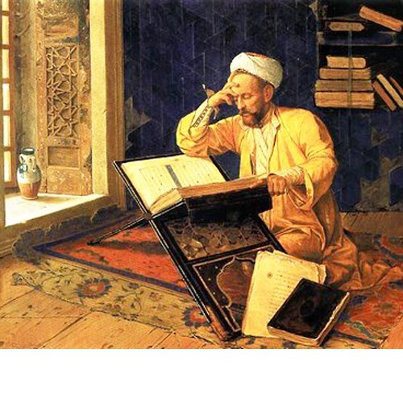
Muslim reading Quran by Osman Hamdi Beg (1842-1910)
In defiance of various ethnocentric attitudes, I will invoke cross-cultural vistas in the treatment on this site, as I have already done in my books. This gesture does not merely imply a diachronic assessment of thought via historical circumstances, but a recognition of recurring trends in different linguistic formats and at different angles of mentation. In the next several entries, I propose to mention some basic features in the careers of six philosophers, three of them medieval Muslims, and three of them modern Europeans. More specifically, I am referring to al-Farabi, Ibn Sina (Avicenna), Ibn Rushd (Averroes), Sir Francis Bacon, Rene Descartes, and Baruch Spinoza.
The first three in this list are primary representatives of falsafa (Islamic philosophy as derived from the Greeks), the fourth was a committed inductionist and empiric, while the two lastmentioned entities were innovative rationalists in the European “gentlemanly amateur” tradition.
The selection is thus fairly wide-ranging. The ethnic features are varied. Farabi was apparently an Iranian, Ibn Rushd a Spanish Arab, Ibn Sina an Iranian, Bacon a British politician, Descartes a French Catholic radical, and Spinoza a freethinking Jew. Taken together, they exhibit a spectrum of philosophical attitudes. A blog format of description can only indicate a few of the complexities.
Most Western readers are only familiar with the last three entities. It is worth repeating here that Bacon, Descartes, and Spinoza pioneered two dispositions that were basically foreign to most of their academic contemporaries. Many of those contemporaries were Aristotelians of a formal category deriving from the days of the Christian Schoolmen. They had not gained effective answers in their worldview, as scientists like Galileo and Kepler discovered. Modern Western philosophy was born in the “citizen” sectors. The academics were then very substantially uncomprehending; retrospectively they have been far more generous.
The Islamic phase dimensions of philosophy have customarily been relegated in the Western tradition. Even Bryan Magee, the “populariser of philosophy,” and advocate of the progressive Yale syllabus, failed to incorporate reference to the falasifa (Muslim philosophers) in his The Story of Philosophy (London: Dorling Kindersley, 1998). This compact coverage favours 2,500 years of Western philosophy, basically moving from the Greeks to the moderns. The gaps are rather substantial.
Magee stated rather briefly (in brackets) that “cultural contact with the Arab world in the 12th and 13th centuries was to have altogether a transforming effect on European intellectual development, and not only with regard to Aristotle” (Magee 1998:55).
Kevin R. D. Shepherd
March 20th 2010
ENTRY no. 16
Copyright © 2010 Kevin R. D. Shepherd. All Rights Reserved.

